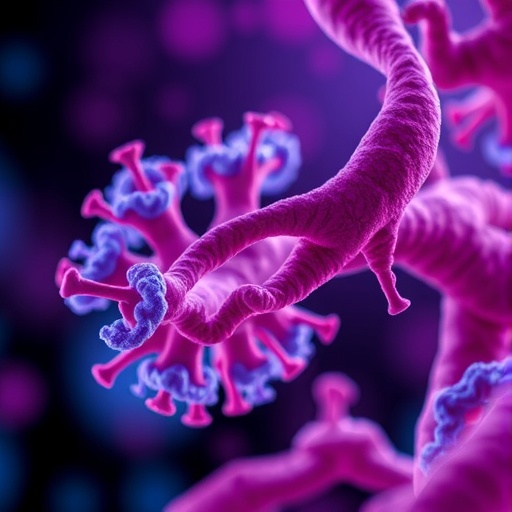In the ongoing battle against cancer, researchers are constantly uncovering new biological vulnerabilities that tumors exploit to sustain their relentless growth and survival. A transformative approach gaining momentum focuses on the intricate interplay between cancer cell metabolism reprogramming and the replication stress these cells endure. This groundbreaking avenue promises not only a deeper mechanistic understanding of cancer progression but also a pioneering strategy for targeted therapeutic intervention.
Cancer cells notoriously hijack and rewire metabolic pathways to fuel their rapid growth, a phenomenon widely recognized as metabolic reprogramming. Unlike normal cells that primarily rely on mitochondrial oxidative phosphorylation, cancer cells often shift their metabolic reliance to aerobic glycolysis—a phenomenon termed the Warburg effect—allowing them to generate both energy and vital molecular precursors at an accelerated pace. This metabolic shift, however, entails a cost: an increased burden of replication stress, which results from conflicting demands placed on the DNA replication machinery during rapid cell division.
Replication stress refers to a state of profound difficulty for cells to faithfully duplicate their DNA within the allotted cell cycle timeframe. In cancer cells, overwhelmed by proliferative signals and metabolic alterations, replication stress manifests through stalled replication forks, increased DNA damage, and genomic instability. While these stresses can impose vulnerabilities exploitable by targeted therapies, cancer cells paradoxically develop sophisticated mechanisms to mitigate replication-associated DNA damage, thereby maintaining their survival advantage.
The study led by Liu, Jiang, Ma, and their colleagues, published recently in Medical Oncology, outlines a novel therapeutic paradigm that hinges on targeting the dynamic crosstalk between metabolic reprogramming and replication stress. By unraveling the molecular underpinnings connecting altered metabolism with DNA replication dynamics, this research delineates potential intervention nodes for disrupting cancer cell homeostasis.
At the core of their findings is the evidence that metabolic reprogramming intensifies nucleotide pool imbalances—a fundamental cause of replication stress. Cancer cells with dysregulated glycolysis and altered mitochondrial function exhibit aberrant levels of nucleotide precursors, leading to replication fork stalling and accumulation of DNA lesions. This nucleotide scarcity or imbalance becomes a metabolic Achilles’ heel that can be manipulated pharmacologically.
Further exploration revealed that enzymes regulating key metabolic pathways, such as glycolytic flux and glutamine metabolism, directly impact replication fork stability and DNA damage response (DDR) pathways. The intricate signaling networks involve ATR-Chk1—master regulators of replication stress response—whose activity is modulated by the metabolic state of the cell. This bidirectional relationship suggests that targeting metabolic enzymes could indirectly sensitize cancer cells to DNA replication stress and vice versa.
Importantly, the metabolic-replication nexus uncovered by Liu et al. is not uniform across cancer types. Tumors harboring specific oncogenic mutations display distinct profiles of metabolic adaptation linked to varying degrees of replication stress. For instance, cancers driven by Myc amplification or loss of tumor suppressors such as p53 exhibit heightened replication stress and dependency on metabolic rewiring, rendering them particularly vulnerable to combination therapies targeting both pathways.
Translationally, this insight has profound implications. Drugs that inhibit metabolic enzymes—such as glycolytic inhibitors or glutaminase blockers—can be paired with agents that exacerbate replication stress or inhibit DDR components, creating synthetic lethality that selectively kills cancer cells. Preliminary preclinical models demonstrate that such combinatorial strategies outperform monotherapies, offering enhanced efficacy and decreased likelihood of resistance development.
Moreover, the study emphasizes the potential of repurposing existing metabolic drugs and DDR inhibitors to implement this dual-targeting approach swiftly in clinical settings. The researchers advocate for a stratified medicine model where metabolic and replication stress biomarkers guide personalized treatment regimens, maximizing patient benefit and minimizing systemic toxicity.
Beyond therapeutics, the mechanistic insights gained prompt a reevaluation of cancer cell biology. The metabolic-epigenetic interface likely plays a role in modulating replication stress responses, suggesting that metabolites could act as signaling molecules influencing chromatin states and DNA repair processes. This interconnectedness offers fertile ground for future research aiming to decode the full complexity of cancer cell adaptation.
From a diagnostic perspective, monitoring metabolic fluxes alongside replication stress indicators in tumor biopsies or circulating tumor DNA might provide robust biomarkers for early detection, prognosis, and treatment response. Non-invasive imaging techniques capturing metabolic alterations correlated with replication stress could also emerge as valuable clinical tools.
Furthermore, an intriguing aspect highlighted is the plasticity that cancer cells exhibit in toggling between metabolic states and replication stress tolerance. This adaptability underscores the need for dynamic therapeutic regimens capable of counteracting tumor evolution and treatment escape, reinforcing the concept of temporally modulated combination therapies.
Collaboration across disciplines—including oncology, metabolism, molecular biology, and bioinformatics—will catalyze the translation of these findings into clinical advancements. Integrative approaches combining multi-omics data and sophisticated modeling are pivotal to identify patient subsets benefiting most from such strategies and to refine therapeutic windows.
In conclusion, the compelling research by Liu and colleagues heralds a new frontier in cancer therapy by intricately linking metabolism reprogramming with replication stress response. This dual exploitation not only deepens our fundamental understanding of tumor biology but also opens promising avenues to devise precision medicine approaches aimed at dismantling the cancer cell’s most critical survival circuits. As the oncology community embraces this conceptual synthesis, it sets the stage for innovative and ultimately more effective cancer treatments in the near future.
Subject of Research: Cancer cell metabolism reprogramming and replication stress interplay as a therapeutic target.
Article Title: Targeting the crosstalk of metabolism reprogramming and replication stress: novel strategy to combat cancer.
Article References:
Liu, W., Jiang, X., Ma, Y. et al. Targeting the crosstalk of metabolism reprogramming and replication stress: novel strategy to combat cancer. Med Oncol 42, 494 (2025). https://doi.org/10.1007/s12032-025-03053-0
Image Credits: AI Generated
Tags: biological vulnerabilities in tumorscancer cell growth dynamicscancer metabolism reprogrammingDNA replication challengesgenomic instability in cancermechanisms of cancer progressionmetabolic pathways in oncologyoxidative phosphorylation vs glycolysisreplication stress in cancer cellstargeted cancer therapiestherapeutic interventions for cancerWarburg effect in tumors





